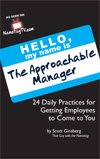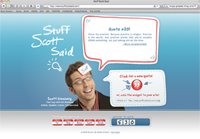 1. Answers. Overrated. Questions are all that matter. Here’s why: Questions advance sales. Questions change relationships. Questions contain energy. What’s more, questions are bridges, catapults and fuel. They create buy-in, earn respect, invite dialogue and transform organizations. When was the last time your precious answers did all that for you??
1. Answers. Overrated. Questions are all that matter. Here’s why: Questions advance sales. Questions change relationships. Questions contain energy. What’s more, questions are bridges, catapults and fuel. They create buy-in, earn respect, invite dialogue and transform organizations. When was the last time your precious answers did all that for you??
2. Balance. It’s for ballerinas. Besides, you can be off balance and still be on purpose. That’s called alignment, and it beats balance any day. Your challenge is to figure out what your life looks like when the integrity of its foundation is in tact. Are you on a path that aligns your actions to your values?
3. Dabbling. Go all out or go home. Be dedicated or be eliminated. Throw yourself wholeheartedly into the game. That’s what it takes to win. And if you don’t want to make this a business, don’t bother. Are you willing to go pro?
4. Formulas. They’re non-updatable, unshakable and inelastic. They’re inflexible, choreographed, canned, insincere, inauthentic and preplanned. They’re often resisted, debated and creates defensiveness. And their rigid, rote learning limits people’s possibilities and stifles their creativity.
Practices, on the other hand, work. They come in the form of simple, doable and human actions. They insinuate instead of impose. They’re adaptable and apply to various situations and people in their own unique way. They’re also easily digested, self-evident, non-threatening and encourage people’s creativity. Which of the two are YOU using?
5. How. How is dangerous. How is a dream destroyer. How is the difference between an Idea Guy and an Execution Guy. And the problem is, too many people are at war with HOW when they should be in love with WHY.
Look: You don’t have to know what you’re doing. You don’t have to know where you’re going. You don’t have to know how you’re going to get there. You just need to move – and you need to know WHY you’re moving. Because if you focus on the WHAT, the HOW will eventually appear. Are you stopped by not knowing how?
6. Knowledge. Anybody can bring it to the table. The real question is: Have you taken action upon your knowledge? That’s the difference between knowing and doing. That’s the difference between information and insight. Experience. Application. Execution. Actionability. Do you just offer expertise and information, or can you deliver REAL insight?
7. Resume. A thing of the past. If you want to persuade potential employers, prospects and customers to hire you, remember this: Your resume is most effective when someone OTHER than you writes it.
So, your resume is your Google ranking. Your comments section on your blog. The testimonial page on your website. Your resume is what people are saying about and after your name. Don’t you think that if someone wants to hire you, she’s going to validate your credibility from multiple sources?
8. Satisfaction. Proves nothing. Even “loyalty” isn’t all that powerful anymore. What you need is customer insistence. Absolutely gotta-have-it factor. Absolute gotta-work-with-this-guy factor. You need people slam their fist down on the boardroom table and say, “We need to hire THIS guy!” Are your customers satisfied, loyal or insistent?
9. You. I don’t know if you got the memo, but YOU are overrated. It’s nothing personal. I’m sure you’re a very smart, cool person. But nobody cares about you. They care about them. They care about money, sex and happiness. And the minute you start to embrace that reality, the minute your world will change forever. It’s amazing how far a little humility will go. Have you gotten over yourself yet?
LET ME ASK YA THIS…
How much money are you losing by having a weak entrepreneurial vocabulary?
LET ME SUGGEST THIS…
For the list called, “99 Questions Every Entrepreneur Should Ask,” send an email to me, and you win the list for free!
* * * *
Scott Ginsberg
That Guy with the Nametag
Author, Speaker, Coach, Entrepreneur
[email protected]
 Never the same speech twice.
Never the same speech twice.
Always about approachability.
Watch The Nametag Guy in action here!

 I have three questions for you:
I have three questions for you: Every science class you’ve ever taken in your life will confirm the following biological truism:
Every science class you’ve ever taken in your life will confirm the following biological truism: 
 The world’s FIRST two-in-one, flip-flop book!
The world’s FIRST two-in-one, flip-flop book! DON’T allow people to make you feel bad for being awesome.
DON’T allow people to make you feel bad for being awesome. 1. Accept bad news without the need for sugarcoating. That way, your people can give it to you straight. They can feel comfortable reporting negative information without the fear of being reamed by your emotional reactivity.
1. Accept bad news without the need for sugarcoating. That way, your people can give it to you straight. They can feel comfortable reporting negative information without the fear of being reamed by your emotional reactivity.  When you’re willing to put it all on the line for something. That’s when you’re ready.
When you’re willing to put it all on the line for something. That’s when you’re ready. Who’s quoting YOU?
Who’s quoting YOU? 1. Decide how impatient you can afford to be. Being impatient might be the smartest decision your company could ever make. My first suggestion is to write the following two words on a sticky note: Just Go. That’s it. Just go.
1. Decide how impatient you can afford to be. Being impatient might be the smartest decision your company could ever make. My first suggestion is to write the following two words on a sticky note: Just Go. That’s it. Just go.  About once a month, I get an email from a reader who kindly points out a typo in one of my books.
About once a month, I get an email from a reader who kindly points out a typo in one of my books. This month we’ve been exploring the “Impending Dangers of Inapproachability.”
This month we’ve been exploring the “Impending Dangers of Inapproachability.”